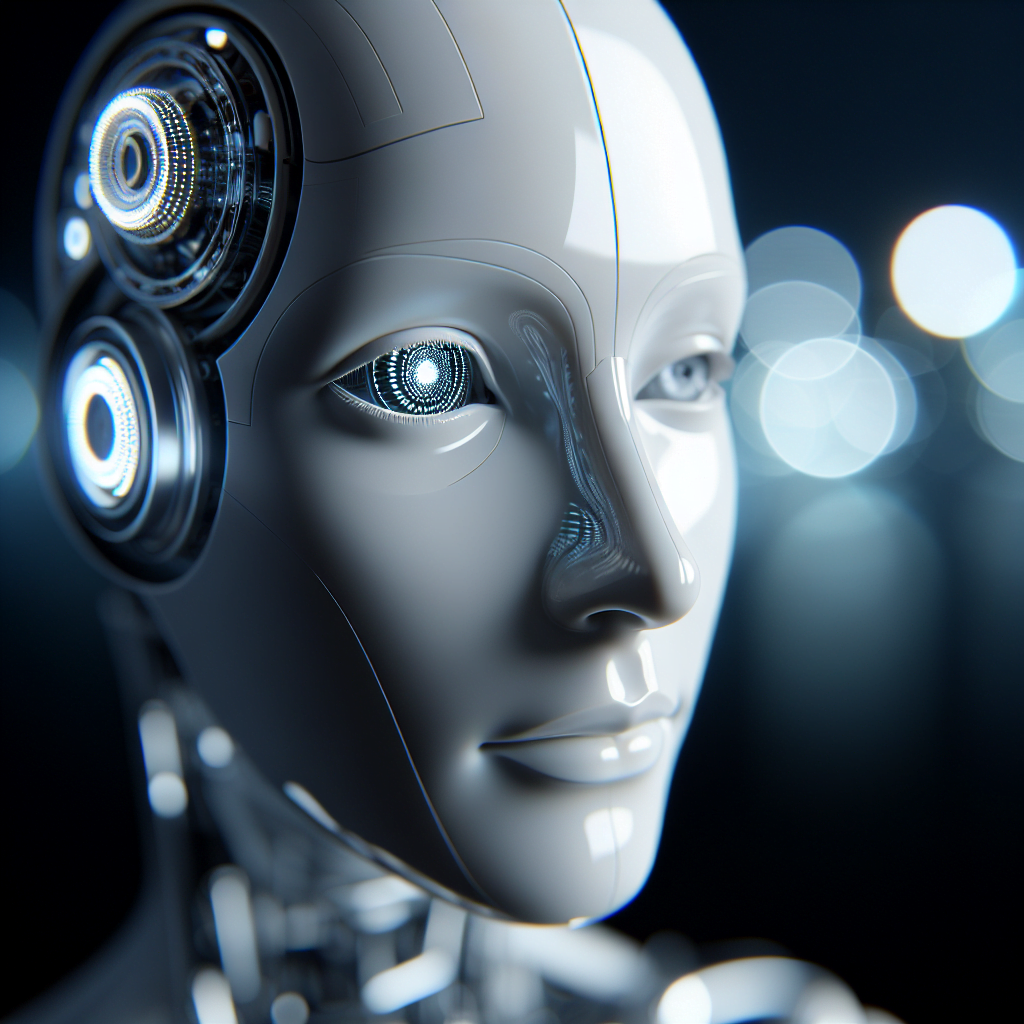In this article, you will explore the exciting possibilities that lie ahead in the realm of artificial intelligence. From advancements in machine learning to the integration of AI in various industries, this comprehensive overview will provide you with a glimpse into the future. Brace yourself for an enlightening journey through the fascinating world of AI, as we examine the potential impact and endless opportunities it holds for us all.

The Current State of Artificial Intelligence
Artificial Intelligence (AI) has experienced significant advancements in recent years, revolutionizing various industries and transforming the way we live and work. One of the key factors driving this progress is machine learning, which empowers computers to learn from data and improve their performance over time. machine learning algorithms are trained on large datasets to identify patterns and make predictions or decisions without explicit programming.
Deep learning, a subset of machine learning, has gained prominence for its ability to simulate the human brain’s neural networks. By mimicking the structure and function of the human brain, deep learning algorithms enable computers to recognize complex patterns, process vast amounts of data, and solve intricate problems. Neural networks, the foundation of deep learning, consist of interconnected nodes (or artificial neurons) that process and transmit information, allowing machines to perceive, understand, and learn from the world.
Another remarkable aspect of AI is natural language processing (NLP), which enables machines to understand, interpret, and generate human language. NLP algorithms analyze textual data and use language models to extract meaning, sentiment, and context from text. This technology has paved the way for applications like chatbots, virtual assistants, and language translators, making human-computer interaction more intuitive and seamless.
Computer vision, another branch of AI, focuses on enabling machines to interpret and understand visual information from images or videos. Through deep learning techniques, computers can now recognize objects, faces, and scenes, and even analyze human emotions or gestures. This technological advancement has unlocked new possibilities in fields like autonomous driving, surveillance systems, and medical imaging, enhancing our ability to derive knowledge and insights from visual data.
Furthermore, robotics and automation have become integral components of AI research and development. Robots and automated systems equipped with AI capabilities are increasingly being used in various industries to perform repetitive tasks, enhance productivity, and improve operational efficiency. These intelligent machines can adapt to different environments, learn from their experiences, and make autonomous decisions, making them valuable assets across sectors such as manufacturing, logistics, and healthcare.
The Impact of Artificial Intelligence on Industries
The impact of AI on industries has been profound, revolutionizing traditional practices and reshaping the way businesses operate. One of the areas significantly transformed by AI is healthcare. AI-powered systems can analyze medical records, detect early signs of diseases, and assist in diagnosing patients. Additionally, AI enables personalized treatment plans, drug discovery, and robotic surgeries, improving patient outcomes and revolutionizing healthcare delivery.
In the financial sector, AI algorithms are used for fraud detection, risk assessment, and trading automation. By analyzing extensive datasets and identifying patterns, AI-powered systems can detect fraudulent activities in real time, minimize financial risks, and enhance the accuracy and efficiency of trading operations. Moreover, AI-driven chatbots and virtual assistants have improved customer service in banking and finance, providing personalized recommendations and assisting with financial planning.
Manufacturing has also witnessed the transformative power of AI, with the rise of smart factories and automation. AI-powered robots and machines can efficiently perform labor-intensive tasks, improving production speed, accuracy, and quality. Predictive maintenance, enabled by AI, helps identify potential faults in machinery and optimize maintenance schedules, reducing downtime and increasing productivity. Additionally, AI-driven supply chain management systems optimize inventory levels, demand forecasting, and logistics, streamlining operations and reducing costs.
Furthermore, the transportation industry has embraced AI for autonomous vehicles, route optimization, and traffic management. Self-driving cars powered by AI algorithms can improve road safety, reduce accidents, and enhance transport efficiency. AI also facilitates intelligent traffic control systems that monitor traffic flow, manage congestion, and optimize travel routes, improving commute times and reducing fuel consumption.
Retail has experienced a significant transformation with the adoption of AI technologies. AI-powered recommendation systems analyze customer data and preferences to provide personalized product recommendations, enhancing the shopping experience and increasing customer satisfaction. Additionally, AI enables inventory management, demand forecasting, and dynamic pricing strategies, helping retailers optimize stock levels, reduce wastage, and maximize profits.
Ethical and Social Implications of Artificial Intelligence
As AI continues to advance, it brings along ethical and social implications that need to be carefully considered and addressed. Privacy and data protection, for instance, have become critical concerns as AI systems gather and process vast amounts of personal data. Striking a balance between utilizing data for AI development and safeguarding individual privacy is crucial to building trust and maintaining ethical standards.
Job displacement and workforce changes are another significant consequence of AI implementation. While AI automates and optimizes various tasks, it also raises concerns about potential job losses and the need for re-skilling or up-skilling the workforce. Embracing AI technology should be accompanied by initiatives to ensure a just transition and provide opportunities for workers to adapt and thrive in the evolving job market.
The risk of bias and discrimination is another important consideration when deploying AI systems. Since AI algorithms learn from historical data, they can unintentionally inherit biases and perpetuate discriminatory outcomes. Ensuring fairness and impartiality in AI decision-making by addressing bias at both the design and training phases is crucial for equitable and just deployment of AI technology.
The development of autonomous weapons and the potential for AI-driven warfare raises ethical dilemmas and security concerns. AI-powered weapons systems have the potential to operate without human intervention, raising questions about accountability, transparency, and the escalation of conflict. Establishing stringent regulations and international agreements to govern the development and deployment of autonomous weapons is necessary to mitigate these risks.
AI’s impact on social roles and relationships should also be considered. As AI becomes more integrated into our daily lives, there is a need to analyze and understand its influence on human interactions, social dynamics, and personal relationships. Deepening our understanding of these changes will enable us to harness the benefits of AI while preserving and nurturing our social fabric.
Emerging Trends in Artificial Intelligence
The field of AI is constantly evolving, and several emerging trends are shaping the future of this technology. Explainable AI (XAI) aims to enhance the transparency and interpretability of AI algorithms, enabling users to understand how and why certain decisions are made. This will be crucial in domains where the ability to explain decisions is necessary, such as healthcare, finance, and law.
Edge computing and AI integration hold promises in scenarios where low latency and real-time decision-making are crucial. By processing data locally on edge devices, AI algorithms can provide rapid responses, reducing the reliance on cloud infrastructure. This trend is particularly relevant for applications like autonomous vehicles, where split-second decision-making is essential for safety.
Generative AI, which focuses on creating new and original content, has gained attention in recent years. From generating art and music to designing products and writing stories, generative AI has the potential to enhance creativity and drive innovation. This technology opens up new possibilities for artists, designers, and content creators, pushing the boundaries of human imagination.
AI-powered personal assistants have become an integral part of our everyday lives, with platforms like Siri, Alexa, and Google Assistant. These virtual assistants use natural language processing and machine learning to understand and respond to user queries, performing tasks like setting reminders, composing emails, and controlling smart home devices. The continuous improvement and integration of these personal assistants will continue to enhance user experiences and simplify daily tasks.
The Internet of Things (IoT) is another area where AI is expected to have a significant impact. As more devices become connected, AI algorithms can leverage the vast amount of data generated by these devices to improve decision-making and optimize system performance. AI-powered applications in IoT extend to diverse domains, including smart homes, smart cities, agriculture, and industrial automation.
Challenges in Artificial Intelligence Development
While AI holds great promise, several challenges must be addressed for its successful development and deployment. One critical challenge is ensuring the quality and availability of data. AI algorithms heavily rely on large and diverse datasets for training, requiring access to high-quality data sources. The collection, labeling, and storage of data pose considerable challenges, and ensuring data privacy and security is of paramount importance.
The lack of regulations and standards in the AI field is another pressing challenge. As AI technology progresses rapidly, there is a need for robust regulations and standards to govern its deployment and use. These regulations should address issues like data privacy, algorithmic transparency, and accountability to uphold ethical and societal considerations.
Ethical decision-making is a challenge in AI development, particularly when AI systems make autonomous decisions that can have significant consequences. Ensuring that AI algorithms are designed and trained to prioritize ethical principles and align with societal values is crucial. This requires interdisciplinary collaboration between AI researchers, ethicists, policymakers, and stakeholders to develop frameworks that uphold ethical standards.
Interoperability and integration of AI systems pose technical challenges. As AI technology becomes more prevalent, it is essential to enable interoperability between different AI systems and ensure seamless integration with existing infrastructure. This will facilitate the exchange and utilization of AI-powered insights across domains and industries, fostering collaboration and innovation.
Cybersecurity risks are amplified with the increased adoption of AI. AI systems that analyze sensitive data are potentially vulnerable to attacks, such as adversarial attacks or data poisoning attacks, which can lead to significant damages. Securing AI systems against these threats requires robust cybersecurity measures, including encryption, anomaly detection, and ongoing monitoring of AI algorithms and models.
The Role of Artificial Intelligence in Scientific Discoveries
The potential of AI in scientific discoveries is vast, with AI advancements enabling breakthroughs in various fields. In drug discovery and development, AI algorithms can analyze vast amounts of molecular data, predict molecular structures, and accelerate the process of identifying potential drugs. AI-driven models have the potential to revolutionize personalized medicine, enabling tailored treatment plans based on an individual’s genetic makeup.
Climate change and environmental studies also benefit from AI’s capabilities. AI algorithms can analyze climate data, satellite imagery, and sensor data to identify patterns, predict weather patterns, and assess the impact of climate change. AI-driven models provide valuable insights for policymakers, enabling effective mitigation and adaptation strategies.
Genomics and precision medicine have been revolutionized by AI, with the ability to analyze large-scale genomic data and identify genetic variations associated with diseases. AI algorithms enable accurate diagnosis, more targeted treatment plans, and disease risk prediction, improving patient outcomes and revolutionizing healthcare.
AI also plays a crucial role in particle physics and astronomy, assisting in data analysis, pattern recognition, and simulation. AI algorithms have been instrumental in discovering new particles, analyzing cosmic radiation, and identifying patterns in astronomical data. The combination of AI and big data in these fields opens up new frontiers for scientific exploration and understanding.
Predictive analytics, enabled by AI, has transformed various scientific domains. By analyzing historical data and identifying patterns, AI algorithms can make predictions about future events, enabling proactive decision-making and intervention. Predictive analytics applications range from predicting disease outbreaks to optimizing energy consumption and resource allocation.
Artificial Intelligence in Everyday Life
AI has become an integral part of our everyday lives, enhancing convenience, efficiency, and security. Virtual assistants like Siri, Alexa, and Google Assistant have become household names, answering our questions, providing recommendations, and controlling smart home devices. These virtual assistants use AI technologies like natural language processing and machine learning to understand and respond to user queries, making our interactions with technology more intuitive and seamless.
Smart homes, enabled by AI and IoT, offer numerous benefits to homeowners. AI-powered systems can learn our preferences, optimize energy usage, and automate routine tasks. From adjusting the thermostat to monitoring security cameras, smart homes enhance comfort, security, and energy efficiency, making our lives easier and more convenient.
Autonomous vehicles, one of the most significant applications of AI, have the potential to transform transportation. Self-driving cars powered by AI algorithms can improve road safety, reduce accidents caused by human error, and enhance traffic efficiency. The convenience and productivity gains of autonomous vehicles are expected to revolutionize transportation and urban planning.
Recommendation systems powered by AI have transformed the way we consume content and make purchase decisions. AI algorithms analyze our behavior, preferences, and historical data to provide personalized recommendations on movies, music, books, products, and more. These systems enhance user experiences, simplify decision-making, and contribute to the growth of e-commerce platforms.
AI has also played a crucial role in cybersecurity and fraud detection. AI-powered systems can analyze large volumes of data, detect anomalies, and identify potential threats or fraudulent activities in real time. Faced with an increasing number of cyber threats, AI algorithms provide the speed and accuracy required to defend against attacks and safeguard our digital lives.
The Future of Artificial Intelligence Research
Artificial intelligence research continues to push the boundaries of innovation, opening up new frontiers and possibilities. One of the key areas of focus is the development of Artificial General Intelligence (AGI). AGI aims to create intelligent systems that can perform any intellectual task that a human can do. While AGI remains an ambitious goal, progress in this area could potentially bring about groundbreaking advancements in various domains.
Advancements in hardware are crucial in shaping the future of AI research. The demand for faster processing, increased computational power, and improved energy efficiency drives the development of specialized AI hardware. Innovations like neuromorphic computing, which mimics the structure and function of the human brain, have the potential to unlock new possibilities in AI research and enable more efficient and scalable AI systems.
Quantum computing is another frontier in AI research. Quantum computers leverage the principles of quantum mechanics to perform complex calculations with extraordinary speed and efficiency. This technology has the potential to revolutionize AI by tackling computationally intensive tasks, such as optimization problems and pattern recognition, with unprecedented capabilities.
Brain-computer interfaces (BCIs) aim to establish direct communication between the human brain and machines. By interpreting neural signals and translating them into actionable commands, BCIs could redefine human-computer interactions and enable individuals with disabilities to regain mobility and independence. BCIs also hold potential in fields like neuroscientific research and cognitive enhancement.
Government and Policy Considerations for Artificial Intelligence
With the rapid advancement of AI, governments and policymakers play a crucial role in setting regulations, guidelines, and ethical frameworks to harness its benefits while minimizing risks. Ethical guidelines and regulations should be established to ensure responsible AI development and deployment. These guidelines should address issues like transparency, accountability, privacy, fairness, and security.
Data governance and privacy laws are essential considerations in AI development. Governments should enact robust data protection laws to safeguard individual privacy and regulate data handling practices. Encouraging responsible data sharing, ensuring anonymization and secure storage, and establishing data governance frameworks are critical in the era of AI.
Investment and funding are essential for driving AI research and innovation. Governments should prioritize AI research and development, allocate resources, and establish funding mechanisms to support academia, startups, and industry. Encouraging public-private partnerships and collaboration can accelerate the progress of AI technology and its applications.
Education and reskilling programs are crucial to prepare the workforce for the AI-driven future. Training programs should be implemented to equip individuals with the skills required to adapt and thrive in the changing job market. Upskilling initiatives should focus on developing expertise in areas where human judgment, creativity, and emotional intelligence continue to be valuable.
International collaboration is essential for tackling global challenges and ensuring the responsible and inclusive development of AI. Governments should foster collaboration between countries, encourage knowledge sharing, and establish international norms and standards. This collaboration will help address ethical dilemmas, resolve regulatory conflicts, and ensure the responsible global deployment of AI.
Conclusion
Artificial intelligence has made significant strides in recent years, transforming industries, revolutionizing everyday life, and pushing the boundaries of scientific discovery. Advancements in machine learning, deep learning, natural language processing, computer vision, and robotics have paved the way for applications across sectors like healthcare, finance, manufacturing, transportation, and retail.
However, along with the exciting progress, ethical and social implications must be considered. Ensuring privacy and data protection, addressing job displacement, mitigating bias and discrimination, regulating autonomous weapons, and understanding the impact on social roles are essential for responsible AI development.
Emerging trends like explainable AI, edge computing, generative AI, AI-powered personal assistants, and AI in IoT offer new perspectives and challenges for future AI applications. Overcoming challenges related to data quality, lack of regulations, ethical decision-making, interoperability, and cybersecurity will be crucial for the successful development of AI technology.
AI’s role in scientific discoveries, everyday life, and the future of research highlights the immense potential and transformative power of this technology. Government and policy considerations focusing on ethical guidelines, data governance, investment, education, and international collaboration will shape the responsible deployment of AI and its impact on society and humanity.
In conclusion, the future of artificial intelligence is full of exciting possibilities and challenges. By embracing ethical AI development, addressing societal implications, and fostering collaboration, we can harness the potential of AI to create a better future for all.



